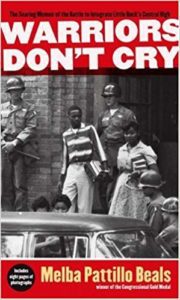A Year in Hell

How did Brown vs the Board of Education affect the children? In her searing memoir, Warriors Don’t Cry, Melba Pattilo Beals shows graphically the impact of integration on her, her family, and the Little Rock community where she lived. When integration came to Central High School in 1957, most teenage girls were gyrating to Elvis or dancing to Buddy Holly’s “Peggy Sue”. Melba was too distracted by lighted sticks of dynamite and escaping the hang rope of a lynch mob to enjoy the bliss of her contemporaries.
Nine African-American teens volunteered to integrate Central High School starting their year in hell. Segregationist adults tutored their children in the act of harrassment while intergrantionists taught non-violence. When the Little Rock Nine entered their high school, they were spat at, pushed, beaten, stepped on, and called every name in the book. They turned the other cheek. However, with the help of family, the NAACP, and inspiration from Thurgood Marshall, the black teens prevailed.
Beals’ memoir is superbly written. She has a way of describing settings and characters to make readers feel as if they are right there in the action. When some thug throws fireballs at Melba, we duck. When acid is tossed into her eyes, we flinch and our eyes sting. Through the power of the pen, Beals shows readers the horrors of prejudice and its affects on the people living on both sides of the track.
Warriors Don’t Cry will provide readers an education about the end of the Jim Crow era, early integration efforts, and the reaction to integration by citizens of a Southern city. Though Warriors is a book all Americans must read, beware that you won’t be able to put it down until the final page.
About the Author




I am old enough to clearly remember this period in our history.